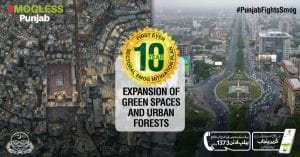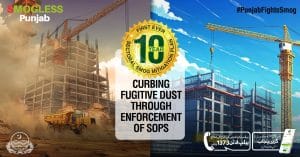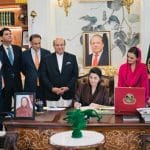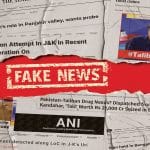The Punjab government’s launch of the #DETOXLAHORE campaign, spearheaded by Minister Marriyum Aurangzeb, marks a pivotal moment in Pakistan’s fight against air pollution. Coupled with the announcement of Lahore’s 10-Year Sectoral Smog Mitigation Plan, this initiative aims to address the persistently high smog levels in Lahore and transform the region’s environmental outlook.
Lahore’s 10-Year Sectoral Smog Mitigation Plan
This groundbreaking plan is Pakistan’s first comprehensive strategy to tackle urban air pollution and smog through targeted, sectoral interventions. Developed by the Punjab government, it aligns with the province’s broader objectives to mitigate the environmental, health, and economic impacts of air pollution, particularly in Lahore, one of the country’s most populous and industrialized cities.
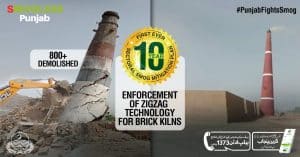
Key Features of the Plan
- Industrial Emissions
-
- Introduction of cleaner production techniques and adoption of zigzag technology in brick kilns.
- Transition to low-emission fuels and installation of emission testing systems to monitor industrial pollution.
- Vehicular Pollution
-
- Encouragement of electric vehicles (EVs) and phasing out older, high-pollution vehicles.
- Expansion of public transport networks to reduce private vehicle dependency.
- Implementation of fuel quality standards and vehicle fitness programs.
- Agricultural Sector
-
- Promotion of sustainable practices, such as crop residue management and biogas production.
- Incentives for farmers to curb stubble burning, a major contributor to seasonal smog.
- Urban Planning
-
- Expansion of green spaces and urban forests to serve as natural carbon sinks.
- Adoption of smog-resilient urban designs and improved management of construction dust.
- Energy Sector
-
- Transition to renewable energy sources like solar and wind power.
- Modernization of power plants to reduce emissions and promotion of energy-efficient technologies.
- Monitoring and Enforcement
-
- Deployment of enhanced air quality monitoring systems and real-time smog alert protocols.
- Strengthening of the Environmental Protection Department (EPD) for more robust enforcement.
#DETOXLAHORE Campaign Measures
As an immediate response, the Punjab government has rolled out key actions targeting Lahore’s air quality crisis:
- Industrial Crackdowns: Factories and brick kilns operating without environmental compliance are being shut down
- Electric Buses: Lahore will see an influx of 200–250 electric buses to curb emissions
- Traffic Regulation: Surveillance systems monitor and flag smoke-emitting vehicles, with fines imposed for repeated violations
- Public Engagement: The government has mandated mask usage in public and launched awareness campaigns to encourage eco-friendly practices.
Enforcement Strategy
The provincial government has declared a zero-tolerance policy for negligence in smog control. A task force comprising environmental experts and enforcement agencies is working on implementing penalties for non-compliance and rewarding adherence to environmental standards. Regular sessions in the Punjab Assembly ensure legislative support for these initiatives
Tackling Smog for the Long-Term
The 10-Year Smog Mitigation Plan complements the short-term actions of #DETOXLAHORE by addressing root causes of air pollution through structural reforms. Together, these measures promise a cleaner, healthier future for Lahore and its citizens, setting an example for the rest of the country.
By targeting Lahore’s air quality holistically, this initiative underscores the importance of government, industry, and public collaboration in combating the escalating environmental crisis. The combined efforts could transform Lahore into a model for sustainable urban living, reducing smog levels and improving the quality of life for generations to come.
Follow the PNI Facebook page for the latest news and updates.



